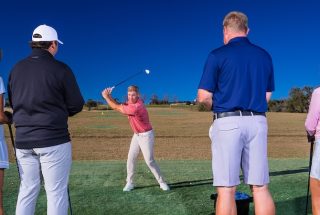Far Hills, N.J. (Aug. 27) – Oak Tree National in Edmond, Okla., has been selected by the United States Golf Association as the site for the 2014 U.S. Senior Open Championship.
The course, designed by Pete Dye and opened in 1976 under the name of Oak Tree Golf Club, was named for a majestic oak tree on the fifth hole. At the time of the opening, Dye called it the finest inland course he had ever built. In April 2009, the name was changed to Oak Tree National.
“This is an exciting day in Oak Tree National’s championship history,” said club owner Ed Evans. “We believe we will have a great test of golf for this national championship. We are honored to be working with the USGA to host the 2014 U.S. Senior Open, and we look forward to having all of our members, the contestants and the fans out to Oak Tree National.”
The 2014 U.S. Senior Open will be the second USGA championship to be played at Oak Tree National, following the 1984 U.S. Amateur Championship won by Scott Verplank, who resides in Edmond and attended Oklahoma State University.
Other major golf events played at Oak Tree National were the 1988 PGA Championship won by Jeff Sluman and the 2006 Senior PGA Championship won by Jay Haas.
The 2010 U.S. Senior Open will be played at Sahalee Country Club in Sammamish, Wash., July 29-Aug. 1; the 2011 championship will be held at Inverness Club in Toledo, Ohio, July 28-31; the 2012 championship will be conducted at Indianwood Golf and Country Club in Lake Orion, Mich., July 12-15; and the 2013 championship will be held at Omaha (Neb.) Country Club, Aug. 1-4.
About the USGA
The USGA is the national governing body of golf in the USA and Mexico, a combined territory that includes more than half the world’s golfers and golf courses.
The USGA annually conducts the U.S. Open, U.S. Women’s Open, U.S. Senior Open, 10 national amateur and two state team championships. It also helps conduct the Walker Cup Match, Curtis Cup Match and World Amateur Team Championships.
The USGA also writes the Rules of Golf, conducts equipment testing, provides expert course maintenance consultations, funds research for better turf and a better environment, maintains a Handicap System®, celebrates the history of the game, and administers an ongoing “For the Good of the Game” grants program, which has allocated more than $65 million over 13 years to successful programs that bring the game’s values to youths from disadvantaged backgrounds and people with disabilities. For more information about the USGA, visit www.usga.org.
Contact:
Pete Kowalski (pkowalski@usga.org)
Web Address: www.usga.org
USGA Phone: 908-234-2300 ext.1322 (office) 908-216-8435 (cell)




